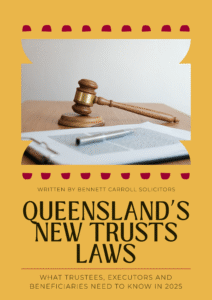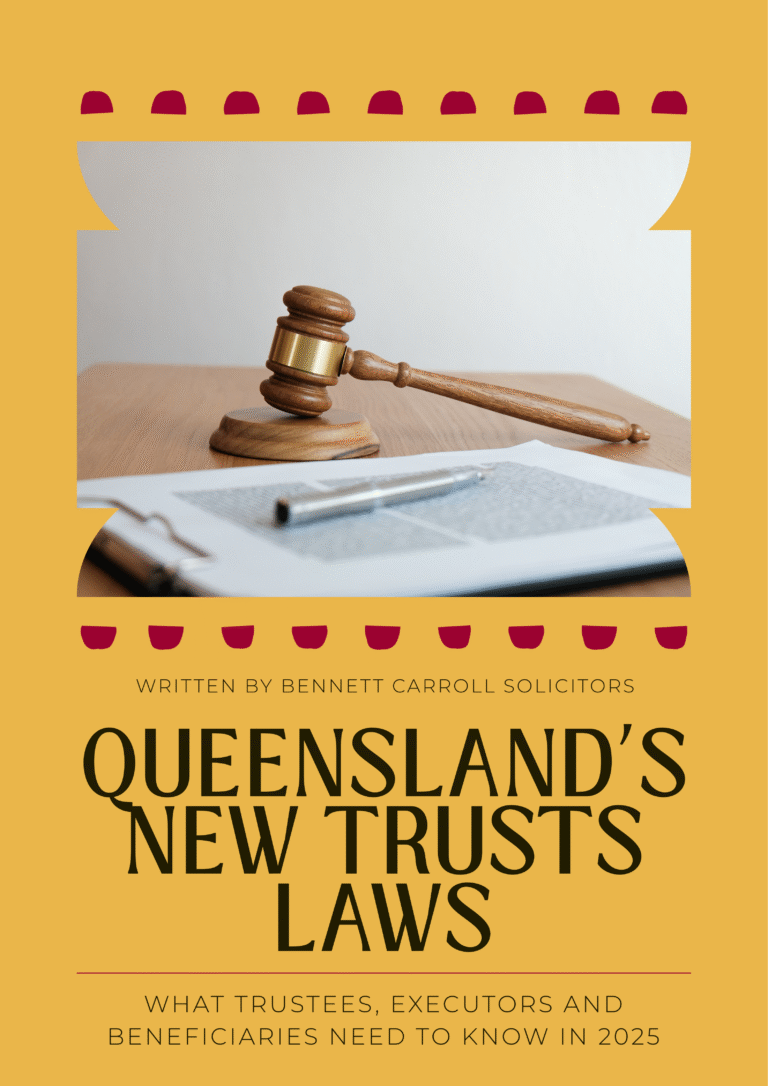On 1 May 2025, the Queensland Parliament passed the Trusts Bill 2025 (Qld), replacing the nearly 50-year-old Trusts Act 1973 (Qld). Once proclaimed, the Trusts Act 2025 will apply to all trusts in Queensland, regardless of when they were created.
If you’re a trustee, executor, personal representative, administrator, or beneficiary of an estate in Queensland or a trustee, beneficiary or appointor of a family or discretionary trust, in Queensland these changes affect you.
Why These Trust Law Changes Matter
The new legislation modernises trust law by:
- Applying to all trusts, including family, testamentary, and SMSF trusts.
- Giving statutory power to trustees that can override trust deed clauses (section 6).
- Introducing mandatory legal duties for trustees.
- Expanding beneficiaries’ rights to inspect records.
- Clarifying how trustees are appointed, replaced, or removed.
These reforms stem from over a decade of reform, including recommendations by the Queensland Law Reform Commission.
See how these changes fit into your overall estate planning strategy in Queensland.
Who Needs to Know
This law affects:
- Trustees, whether professional or private
- Executors, personal representatives and estate administrators
- Family trust appointors
- SMSF trustees
- Beneficiaries — even potential ones
- Accountants, financial advisors, and business owners
When Does the New Trusts Act Apply?
The Trusts Act 2025 has been passed by the Queensland Parliament but will only come into force once proclaimed. Until that date, the old Trusts Act 1973 continues to apply. It is worth noting that all new trusts commencing on or after 1 August 2025 have an extended perpetuity period of 125 years unless a shorter period is specific in the trust deed due to the commencement of The Property Law Act 2023 (Qld).
Key Changes Explained Simply
1. Trustee Duties You Can’t Ignore
When the new act comes into force, a trustee must:
- Act honestly and in good faith (section 63)
- Exercise the car, diligence and skill that a prudent person of business would exercise in managing the affairs of other persons. (section 62)
- Keep accurate records for at least three years after the termination of the trust (section 64)
- Allow beneficiaries to inspect records upon request (section 65)
Our article on trustee duties and risks in family trusts highlights how these new obligations may impact trust liability.
2. New Rules for Trustee Appointments
If no appointor acts and in certain circumstances:
- The personal representative of the deceased trustee can appoint a replacement (section 21)
- An attorney or financial administrator may step in as trustee if a trustee lacks capacity (section 22)
Explore our guide to executor duties and estate administration in Queensland for practical steps.
3. Who Can and Can’t Be a Trustee
The new act will automatically disqualify the following from being trustees:
- Minors
- Bankrupt individuals or bankrupt directors of companies (section 13)
- Trusts cannot have more than four trustees, unless court approval is obtained (section 14).
4. Beneficiary Rights Are Stronger
Under the new Act, beneficiaries also have enhanced legal rights:
- Request and inspect trust documents
- Challenge trustees for failing to meet legal standards
Understand more in our article: What can beneficiaries do when executors misbehave?.
5. Trustee Powers Modernised
Pursuant to the new Act, trustees gain the powers of an “absolute owner” (section 82), enabling seamless asset management, sales, leasing, and development.
6. New Time Limits & Perpetuity Period
From 1 August 2025, the Property Law Act 2023 (Qld) extends the trust perpetuity period from 80 to 125 years.
Plus:
- When the new Trusts Act comes into effect, personal representatives will have two years to wind up a business in a deceased estate (Succession Act 1981, – new s 49B).
What You Should Do Now
- ✅ Review your trust deed for conflicts with the new laws
- ✅ Confirm your trustees and appointors are eligible
- ✅ Align your estate and succession plans with the updated legislation
- ✅ Seek advice if your trust handles property, business, or vulnerable beneficiaries
Need Legal Advice?
At Bennett Carroll Solicitors, we support clients across Brisbane, Ipswich, Kawana, Mermaid Beach, Upper Mount Gravatt, and Stafford with:
- Trust deed and estate plan reviews
- Guidance for trustees and executors
- Assistance with disputes and compliance
- Efficient electronic legal services Queensland-wide
Contact us today for a personalised trust health check and stay ahead of the curve.
Browse more legal insights for trustees and estate planning on our Advice & Articles page.









